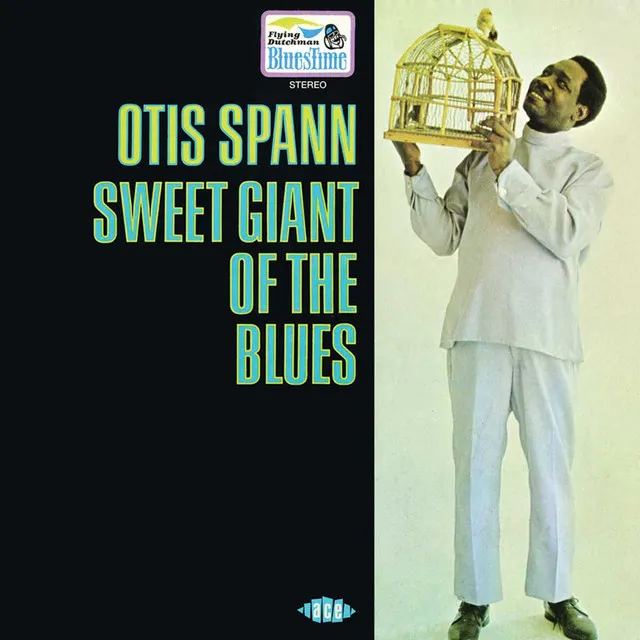
I Wonder Why
Sweet Giant of the Blues
- 01.01.1969
- 0 Streams
- 4 min 22 sec

A core member of Muddy Waters' legendary bands of the 1950s and '60s, pianist, vocalist, and composer Otis Spann is widely considered the standard bearer for postwar blues pianists. Spann played on most of Waters' classic Chess sides between 1953 and 1969, the driving engine on numerous Waters' jukebox and radio hits including "Got My Mojo Working" and "Mannish Boy." He offered a barnstorming approach to boogie woogie and stride in developing the Chicago blues piano style. His own debut, 1960's Otis Spann Is the Blues, also featured the guitar and vocals of Robert Lockwood, Jr. The Blues of Otis Spann appeared in 1964 and featured the mysterious guitarist "Brother" (a pseudonym for Waters). Spann cut well-received sides for Bluesway -- 1966's The Blues Is Where It's At and 1968's The Bottom of the Blues. In 1969, he released five albums, among them Cryin' Time for Vanguard, The Biggest Thing Since Colossus for Blue Horizon, and Super Black Blues with T-Bone Walker and Big Joe Turner. He was inducted into the Blues Hall of Fame in 1980. Spann's birth date and birthplace are in dispute. Some claim he was born in Jackson, Mississippi, in 1930, but blues researchers Bob Eagle and Eric LeBlanc concluded from census records and other official information that he was born in 1924 in Belzoni, Mississippi. His birth father was, according to apocryphal sources, a pianist called Friday Ford. His mother, Josephine Erby, was a guitarist who played with Memphis Minnie and Bessie Smith. Spann's stepfather, Frank Houston Spann, was a preacher and musician. Otis was one of five children. He began playing the piano at seven, with some instruction from Friday Ford, Frank Spann, and, reportedly, Little Brother Montgomery. At 14, he was playing in bands around Jackson. He found inspiration in the 78 rpm records of Big Maceo. After his mother's death, he followed his stepfather to Chicago where he worked as a bricklayer. In the Windy City, Spann began pursuing day work and professional music opportunities, Big Maceo took the young pianist under his wing. Spann gigged on his own and with guitarist Morris Pejoe before hooking up with Waters in 1952. His first Chess date behind the Chicago icon the next year produced "Blow Wind Blow." Subsequent Waters classics sporting Spann's ivories include "Hoochie Coochie Man," "I'm Ready," and "Just Make Love to Me." Strangely, Chess somehow failed to recognize Spann's vocal abilities. His own Chess output was limited to a 1954 single, "It Must Have Been the Devil," that featured B.B. King on guitar, and sessions in 1956 and 1963 that remained in the can for decades. So Spann looked elsewhere and waxed the stunning Otis Spann Is the Blues for Candid with guitarist Robert Jr. Lockwood in 1960, and recorded with Lonnie Johnson in Copenhagen in 1963, resulting in the following year's See See Rider for Storyville -- it also netted a mostly solo outing for the pianist. 1964's The Blues of Otis Spann for British Decca found him in the company of Waters (as "Brother") and Eric Clapton. That same year he cut The Blues Never Die! for Prestige, sharing vocal duties with James Cotton. Testament recorded Spann as a leader, releasing Otis Spann's Chicago Blues in 1965. The Blues Is Where It's At, Spann's enduring 1966 album for ABC-Bluesway, sounded like a live recording but was actually a studio date enlivened by a gaggle of enthusiastic onlookers who applauded every song (Waters, guitarist Sammy Lawhorn, and George "Harmonica" Smith were among the support crew on the date). A Bluesway encore, The Bottom of the Blues, followed in 1968 and featured Otis' wife, Lucille Spann, helping out on vocals. That same year he recorded Cryin' Time for Vanguard. Spann's last few years with Muddy Waters were memorable for their collaboration on the Chess set Fathers and Sons, but the pianist was clearly pining to pursue his solo career. He signed with Blue Horizon and recorded with British blues-rockers Fleetwood Mac, who served as his backing band on 1969's The Biggest Thing Since Colossus. After turning over the Waters' band's piano chair to Pinetop Perkins in 1969, Spann released The Everlasting Blues vs. Otis Span and Up in the Queen's Pad for Spivey, Super Black Blues -- with T-Bone Walker and Big Joe Turner -- for BluesTime/Flying Dutchman, and Sweet Giant of the Blues for Prestige. That year also saw the release of the archival I Was Raised in Mississippi, which was recorded in New York in 1960. Fate didn't grant Spann much time to achieve his solo dreams, however. He died from liver cancer in April 1970. That very year, Delmark released Southside Blues Jam by Junior Wells. Recorded between 1969 and early 1970, Spann was a featured collaborator alongside the leader and guitarist Buddy Guy. The set won lavish praise for Spann's imaginative soloing and his interplay with Guy. In 1972, the Ann Arbor Blues and Jazz Festival re-named their location Otis Spann Memorial Field. In 1980, he and 19 of his peers were inducted into the freshman class of the Blues Hall of Fame. Spann's grave was unmarked for nearly three decades. Steve Salter (president of the Killer Blues Headstone Project) wrote to Blues Revue magazine, asking them to help him remedy the situation. After an editorial was published, global blues enthusiasts donated to the cause. On June 6, 1999, the gravestone was unveiled in a private ceremony. Spann's influence endures into the 21st century. His work has appeared on dozens of compilations and his catalog has been reissued several times. ~ Bill Dahl & Thom Jurek, Rovi